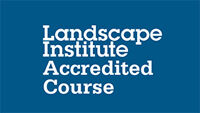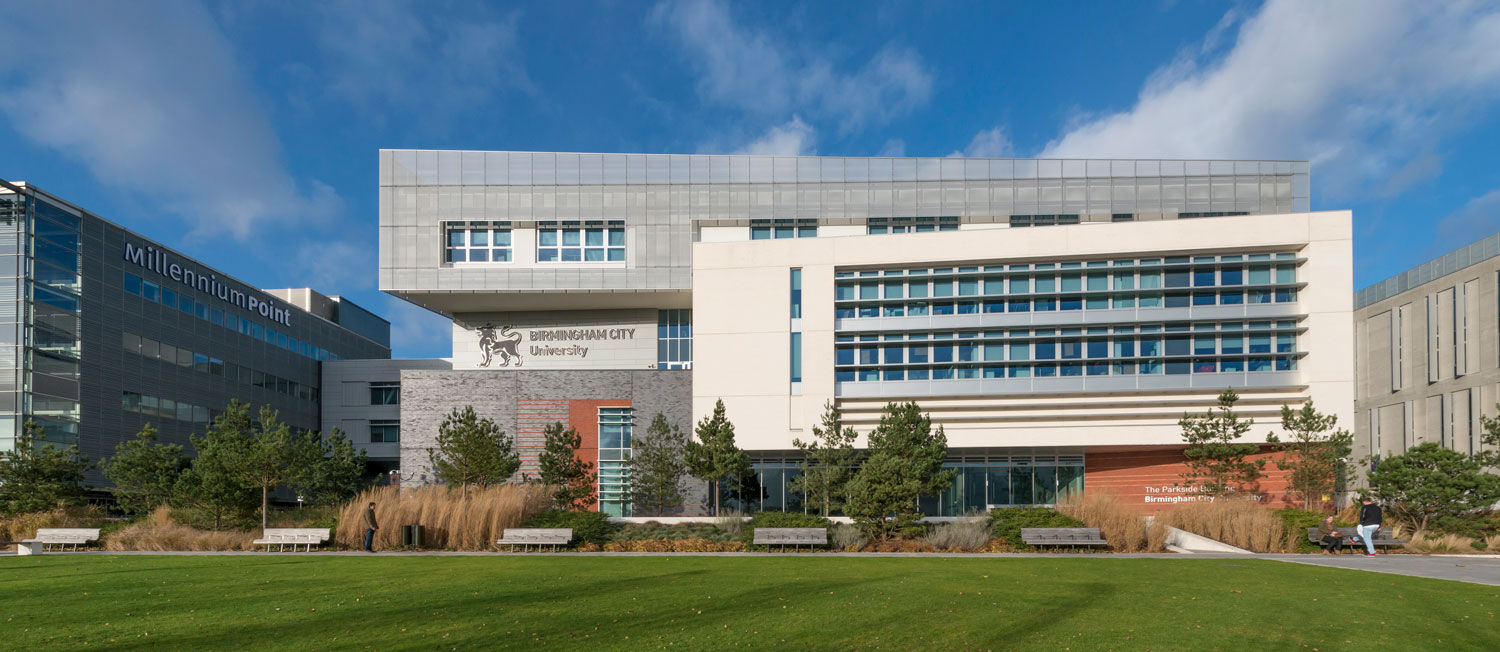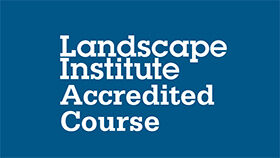Landscape Architecture (Conversion Masters) - MLA
Currently viewing course to start in 2024/25 Entry. Switch to 2025/26 Entry
This forward looking and innovative MLA Landscape Architecture is a Conversion Masters that offers applicants who wish to make a career change the opportunity to qualify and become a professional landscape architect....
- Level Postgraduate Taught
- Study mode Full Time
- Award MLA
- Start date January 2025
- Subject
- Location City Centre
This course is:
Open to International Students
Overview
This forward looking and innovative MLA Landscape Architecture is a Conversion Masters that offers applicants who wish to make a career change the opportunity to qualify and become a professional landscape architect.
The MLA Landscape Architecture course provides you with opportunities to explore responses to climate change emergency and biodiversity loss, and help in planning and designing meaningful, fair and resilient landscapes, places and communities of the future. Exploring these themes and issues is central to our common future and our Landscape Architecture course is very well placed to build employability skills that will position you at the forefront of these subjects.
The course stimulates a design studio culture and encourages high levels of research, design innovation, creativity and distinct ownership of ideas and concepts. We put an emphasis on contemporary practice and real-world projects aligned to develop the critical integration of theory and practice across scales, from landscape planning to master planning to detail design.
We invite applications from students from any disciplinary background.
If you already have a degree in Landscape Architecture please see our one-year MA in Landscape Architecture option.
What's covered in this course?
This Conversion Masters is professionally oriented and has two stages: Year one is structured to develop key design and communication skills that support all aspects of projects in a studio-based learning environment which is underpinned by landscape history and theory lectures. Students will learn that landscape is a sequence of interrelated designed environments connected by land, ecology, water, climate and infrastructure, sitting in a cultural context that extends from parish to global, political and economic systems. The design skills will develop from process-led narratives using industry standard visual communication and analysis techniques, which include digital mapping and three-dimensional modelling, model making, virtual reality, visualisation, rendering, drawing, and design across the range of scales.
Year two builds on the foundation of knowledge and skills acquired in year one and will help you develop further the creative, artistic, technical and intellectual abilities through a diverse range of design projects that explore contemporary issues, which grow in scale and complexity. The format of studio learning is continued with an increased emphasis on research and experimentation. Design themes include research-led design projects relating to landscape health and well-being, habitat creation and biodiversity, climate change, settlement design and food security, as well as large infrastructure schemes like High Speed 2 (HS2) and the West Midlands National Park.
Our modules, including our new Design for Climate Change module, provide a fascinating forum for systems scale interventions, innovation and exploration of new sustainable approaches to respond to the climate change emergency, imaginative solutions to extreme weather events, biodiversity loss and for the planning and designing of ecologically inspired places and communities.
Our links to industry, local authorities and our Co.Lab partners offer an opportunity for you to be involved in the complex nature and challenges of being a landscape architect in the real world. These extend to collaborating with local stakeholders and institutions and working alongside colleagues across the University on projects that demonstrate the authority of Landscape Architecture in improving the quality of future urban and rural living.
The Professional Placement version of the course is optional and is offered as an alternative to the standard version of the course. This will allow you to complete a credit bearing, 20-week Professional Placement as an integral part of your Master’s Degree. The purpose of the Professional Placement is to improve your employability skills which will, through the placement experience, allow you to evidence your professional skills, attitudes and behaviours at the point of entry to the postgraduate job market. Furthermore, by completing the Professional Placement, you will be able to develop and enhance your understanding of the professional work environment, relevant to landscape architecture, and reflect critically on your own professional skills development within the workplace.
Employment opportunities and flexible learning
Our postgraduate course has been running for over 60 years which means that over this time a well-established employer network has evolved with former students setting up nationally renowned consultancies representing all levels of the profession from director to associate landscape architect. We have very strong links with local, regional and national employers and through this you will be able to take advantage of these extensive relationships.
Many of our students opt to work in practice and study part-time after year one. To help balance the MLA with your existing commitments, we have structured the course to provide some flexibility so that you have the option to complete the MLA in two years by dedicating one day a week in your first year and two days a week in your second year. Alternatively, you can complete the course over three years by following the one day a week model.
Professional standards
Each year, the course is assessed to evaluate how it meets the accreditation standards set by the Landscape Institute; in particular, how the curriculum prepares employment-ready students. To ensure the academic rigor and creative flair is maintained, the course is reviewed annually by External Examiners.
Our Master’s courses are fully accredited by the Landscape Institute and recognised by the International Federation of Landscape Architects. We are also an active member of the European Council of Landscape Architecture Schools.
Research
Landscape architecture academics at Birmingham City University have partnered with a number of organisations, including West Midlands Combined Authorities, to establish a national park for the West Midlands that provides multiple benefits to the city, the landscape and its inhabitants.
Accredited By
This course is accredited by:
I chose this course as I am interested in encouraging nature within an urban background and there is a strong emphasis on sustainability, the environment and design. The course has changed the way I view the world and encouraged me to think deeply about my surroundings. It is extremely challenging yet rewarding. There is a great balance between the creative and analytical and you are taught how to bring multiple threads together and develop cohesive projects.
Helen Young
Amrutha Chempaliputhenpurayil Raj
Amrutha embarked on a transformative journey, transitioning from her hometown in India to pursuing her passion for architecture in Birmingham. She is now an award-winning student, finally living out her dream as a landscape architect.
Read in fullWhy Choose Us?
- Our MLA Landscape Architecture course is accredited by the Landscape Institute and worldwide by the International Federation of Landscape Architects, giving you a good start on becoming a Chartered Landscape Architect.
- Our highly experienced educators mentor mature students from any background to become professional Landscape Architects.
- We structure our timetable to ensure that students who travel far or have children to drop off at school can manage these commitments more easily.
- Our modules push the boundaries of national and international possibilities for Landscape Architecture. Our Design for Climate Change module helps you develop employability skills that will position you at the forefront of finding design based solutions to the threats on our planet Earth.
- Our modules provide an opportunity to explore real learning scenarios and work on live projects with a range of challenges arising from collaborative partnership with real clients.
- You will benefit from our excellent links and extensive network of local, regional and national practices and employers to support you to find your career path.
Similar Courses
OPEN DAY
Join us for a Virtual Open Event where you'll be able to learn about this course in detail, meet our subject academics and learn more about postgraduate finance, all from the comfort of your own home.
Next Event: 5 February 2025
Entry Requirements
Essential requirements
Essential Requirements
| Essential | ||
|---|---|---|
|
An undergraduate degree in any subject, minimum Lower Second-Class (2:2). |
||
|
IELTS 6.0 overall with 5.5 minimum in all bands. |
International students must meet all the Border Agency entry criteria for the programme.
If you have a qualification that is not listed, please contact us.
Fees & How to Apply
UK students
Annual and modular tuition fees shown are applicable to the first year of study. The University reserves the right to increase fees for subsequent years of study in line with increases in inflation (capped at 5%) or to reflect changes in Government funding policies or changes agreed by Parliament. View fees for continuing students.
Award: MLA
Starting: Jan 2025
- Mode
- Duration
- Fees
- Full Time
- 2.5 years**
-
TBC
- Full Time
- 3 years (including Professional Placement - see below*)
-
TBC
International students
Annual and modular tuition fees shown are applicable to the first year of study. The University reserves the right to increase fees for subsequent years of study in line with increases in inflation (capped at 5%) or to reflect changes in Government funding policies or changes agreed by Parliament. View fees for continuing students.
Award: MLA
Starting: Jan 2025
- Mode
- Duration
- Fees
- Full Time
- 2.5 years**
-
TBC
- Full Time
- 3 years (including Professional Placement - see below*)
-
TBC
**Options and fees
You will have the option to study the MLA full-time or part-time, and beginning in January or September.
Option 1: Full-time
This takes two academic years if you start in September, or 2.5 academic years if you start in January. For example, if you start the course in September 2024, you will finish in summer 2026; if you start the course in January 2025, you will finish in summer 2027. If you choose to add an optional professional placement, this will add six months to the length of the course. For your taught modules, you will attend one day per week in year one, and two days a week following that.
However, in all cases, the tuition fees are only payable in your first two academic years; year one fees are shown above.
* Your professional placement fee will be charged as part of your year two tuition fee. The placement fee will be equivalent to 10% of the total year 2 course fee.
Option 2: Part-time
You can also study the course on a part-time route – available for September start dates only – attending one day a week over three years. Your fees are charged by 20-credit module, so the cost per year of study is based on the credits studied in that year.
Personal statement
You’ll need to submit a personal statement as part of your application for this course. This will need to highlight your passion for postgraduate study – and your chosen course – as well as your personal skills and experience, academic success, and any other factors that will support your application for further study.
If you are applying for a stand alone module, please include the title of the module you want to study in your Personal Statement.
Not sure what to include? We’re here to help – take a look at our top tips for writing personal statements and download our free postgraduate personal statement guide for further advice and examples from real students.
Course in Depth
Year 1
This module introduces you to the scope, extent and diversity of the designed environment and introduces the construct that we live in a dynamic global ecology where human interventions on Earths natural systems range in scale from the modification of Earth’s atmosphere resulting in Climate Change, remodelling of the ice caps, destruction of the rainforest, to legislation and technologies that transforms urban air quality to facilitate the establishment of urban lichen communities. ‘Our Common Future’ sets the framework for Landscape Architects to use innovation and creativity to mitigate and protect our environment. These designed ecologies provide a fascinating laboratory for Landscape Architecture students to investigate, explore and experiment with natural systems and resources using elements of nature to enhance, mitigate and improve the world we live in.
This module builds on the design capabilities achieved in the Designed Ecologies module and provides opportunities for students to develop design skills ensuring competencies in the design of new habitats, modification and adaptation of ecosystems and enrichment of the quality of Landscape spaces in urban, rural and geographies that cross a range of scales.
This module delivers a range of skills that support keys stages of the design process, and is designed to help you develop techniques, abilities and foundation level of knowledge, that will equip you with a range of practical competencies to help you communicate your ideas through all stages of the design process. The development of representational, graphic and verbal skills is essential to communicate designs and to your employability skills and integration in the professional market.
Landscape Culture and Nature introduces students to the cultures, and the historic and contemporary practices in which landscape architecture decisions are made.
The module is set in the wider socio-cultural context and situate landscape architecture within a sequence of historically contingent events and change. It offers an ‘introduction’ to the complex set of influences, interactions and changes that have brought about the UK Landscape. However, many of the principles underlying these will also, by implication, be ‘transferable’ to the study and understanding of other cultures and landscapes.
The module will further explore wider contemporary landscape architecture practice, issues and themes relating to the interfaces between the people, landscapes/cities and nature from the aesthetics, ecological, socio-cultural, political and economic perspectives.
Year 2
The purpose of this module is to introduce the student to the contemporary issues and challenges that landscapes and the built environment are facing. This studio project consists of a number of exercises, undertaken as part of one overall project, that explore the design process by considering design as an analytical, artistic, observant and interpretative activity.
This module provides a fascinating theatre for innovation and exploration of sustainable and new approaches to deal with climate change, biodiversity loss and resilience. You will research the issues and opportunities to inform the design for climate change considering a range of scales as well as the political, economic, social and physical/environment parameters that effect this geographical sphere. According to the Landscape Institute, “professions that best understand the built and natural environments will be best placed to tackle climate change”.
The module is an opportunity to learn and critically reflect on the skills of collaboration. Collaboration is a vital employability skill within the Creative Industries and this module allows you to develop these skills, making use of University facilities, with the support of academic staff. Within this module framework, several kinds of collaborative opportunities are available. Your supervisor may set you a predetermined live project, to enable you to work with other students in a way that is appropriate to your subject area; or there may be opportunities for you to collaborate with staff on research projects. In all cases, you must apply your subject skills to a project which will be agreed in advance with your supervisor.
This module applies and develops the skills and knowledge developed in the design process studio to the research and analysis of detailed design, exploring how ideas can be expressed spatially and visually through the selection and design of hard and soft materials. Contributing to a research strategy that aims to move design issues in landscape architecture away from a purely technical approach towards a conceptually driven and challenging practice, the module connects into the realm of cultural and contextual issues. Increasing complexity, design skill and knowledge of the materiality of the discipline. You will investigate case studies and critically evaluate landscape as the generative influence on the spatial form of the design. Building up knowledge of different perspectives, contextual and trans-disciplinary knowledge students investigate and respond to a contemporary issue such as inclusive design.
The thesis design project is a comprehensive and wide ranging project which is designed to enable you to demonstrate the standards identified in the Master’s level QAA Benchmark Statement. You will engage with the growing international debate around the need to develop new approaches to spatial design, driven by the recognition that the socio-economic benefits of adopting holistic, artistic, ecological and conceptual approaches to master planning and regeneration. This is becoming increasingly evident and are regarded as essential if we are to respond to the challenges of natural resource shortage ("peak oil", water, etc.), climate change adaptation and mitigation, unprecedented urban growth, Health and well-being and a changing economy.
Download course specification
Download nowA large part of this course is taught through design studios with research embedded throughout. The assessment process is by coursework which includes design portfolios and research papers. We feel that this best simulates the way you'd work in the real world and so better prepares you for a career in landscape architecture.
Year one will introduce you to the core problem-solving skills associated with the design process. You will learn to survey several aspects of a site and to analyse and evaluate findings to inform a narrative-driven design proposal. You will understand the socio-cultural and environmental systems involved in landscape architecture, including making connections between people, place and nature in urban and rural ecosystems. At the end of this year you will feel confident to communicate ideas and design proposals using a wide range of visual and graphic communication media.
Year 2 promotes the studio as an environment of investigation, collaboration and experimentation. You will develop your own identity as a designer through personal research leading to a final piece of design work considering how other perspectives should contribute to design decision-making. Your portfolio of skills can be strengthened through the Co.LAB and Design for Climate Change modules, developing client capabilities, collaborative expertise and contextual understanding for the workplace. Your design confidence will increase with the Thesis Design Project which looks at a significant issue of our time and responds to it creatively from macro-scale down to detail design.
Your studies are supported by a series of lectures and workshops delivered by renowned landscape practitioners and educators from the UK and overseas. We continue to develop our International Landscape Architecture Lecture Series and have recently welcomed Martha Schwartz (US), Bruno Marques (New Zealand), Paulo Farinha Marques (Portugal), Merrick, Denton Thompson, Nick Grayson, Ian Lanchbury and Jane Findlay (UK).
Field trips ensure you will have experiential learning and hands-on knowledge about historic and contemporary landscapes and the built environment.
The City Centre Campus Parkside Building captures the magical spirit of the Bauhaus, and gives you access to industry standard facilities, including digital studios, 3D design workshops, wood and metal workshops, ceramics and glass workshops, 3D printing, laser cutting, water jetting, film, tv and photography studios.
This course is accredited by the following organisation:

Landscape Institute
Our course is accredited by the Landscape Institute. LI accreditation requires education providers to meet important criteria which ensure high standards are maintained, meaning you can be sure your course meets the standards needed for you to enter the landscape profession.
Employability
Enhancing your employability skills
This MLA Landscape Architecture course aims to provide graduates with a set of attributes which prepare them for their future careers. You will be able to:
- Produce complex design proposals understanding the current global professional issues and contemporary Landscape Institute policy.
- Gain confident skills and knowledge as a designer to respond to the issues of Climate Change which will position you at the forefront of these subjects.
- Work on live projects, and with real clients, with confidence.
- Work independently and collaboratively in multi-disciplinary environments.
- Be a creative thinker to solve problems in wider professional contexts.
- Negotiate, plan and communicate your designs to a professional standard.
- Work with Industry standard IT, e.g. AutoCAD, Vectorworks, Adobe Suite, Edina Digimap, and other digital modelling.
Graduate jobs and links to industry
We have an established relationship with an extensive network of local, regional and national practices and employers. The reputation of the landscape architecture courses provides a head start for applicants.
Our students enjoy excellent employment opportunities during and after completing the course. Recent graduates are working for an extensive range of practices, including: AHR Global, AECOM, Arup, Atkins Global, BMD Bradley Murphy Design, Camlins Associates, Capita, Define, Fira, FPCR, IDP, LDA Design, Land Use Consultants, Node Urban Design, Liz Lake Associates, Townscape, Pegasus Planning, WSP, Randall Thorp.
There is a clear structure to achieving Chartership status of the Landscape Institute. Recently employed graduate members of the profession are on the ‘Pathway to Chartership’. These are mentored roles in which ‘Associates’ are involved in site mapping and survey work, design development work and supporting the project team in all aspects of the design process.

Maryam Gohari
Graduate
International
Birmingham City University is a vibrant and multicultural university in the heart of a modern and diverse city. We welcome many international students every year – there are currently students from more than 80 countries among our student community.
The University is conveniently placed, with Birmingham International Airport nearby and first-rate transport connections to London and the rest of the UK.
Our international pages contain a wealth of information for international students who are considering applying to study here, including:
- Details of the entry requirements for our courses
- Some of the good reasons why you should study here
- How to improve your language skills before starting your studies
- Information relevant to applicants from your country
- Where to find financial support for your studies.
Our international students
Our international reputation, professional accreditation and outstanding graduate success rate attracts students from the UK, Europe and South East Asia.

Candice Ying Wei
Candice Ying Wei is applying the knowledge from her Master's in her job as an Assistant Landscape Architecture in Atelier Dreiseitl in Beijing just months after graduating.

Chi Ma
(Hong Kong)
Facilities & Staff

Our Facilities
When you join Birmingham City University, the first thing you will notice is the exceptional quality of our campuses. With an investment of over £400 million across our buildings and facilities, we are committed to giving you the very best learning environment to help shape your experience.
You will be based in our multi-million pound Parkside building – a state of the art facility located within our City Centre Campus. Here you will have full access to our recently upgraded, high spec CAD (Computer-Aided-Design) workstations situated within our dedicated computer labs and open access areas. We also provide access to leading edge digital design software, enabling you to explore technical drawing, graphics, 3D modelling, visualization, animation, computation, simulation, and virtual reality.
The Parkside Building is also home to our digital fabrication labs, where you will be able to explore 3D printing, laser cutting, CNC machining, ceramics, glass and traditional model-making, guided by our team of expert technicians with access to our on-site material store, and professional printing facilities.
You’ll also benefit from:
- Design studios
- Physical and digital library
- Loanable laptops
- Dedicated social spaces
- Cafés
Photo Gallery
From industry-standard software, to our workshops and studio spaces, everything you need will be at your fingertips from day one. Working with our dedicated teaching teams and expert technicians, you'll be supported from concept through to completion.
Our staff
Dr Sandra Costa
Academic lead for Landscape Architecture & Course Director MA Landscape Architecture
Sandra is a lecturer and researcher in landscape architecture and design with diversified experience encompassing teaching, research and professional practice. She has lectured in the UK and Portugal in undergraduate and postgraduate courses. Her teaching explores current issues and challenges faced by landscapes and the built environment, to...
More about SandraRussell Good
Senior Lecturer in Landscape Architecture, Deputy Course Director MA Landscape Architecture
Russell Good is a Senior Lecturer in Landscape Architecture, Deputy Course Director of MA Landscape Architecture; a landscape architect, graphic designer and keen mountain biker. Russell’s research explores ecological and hydrological systems in the context of climate change, in order to inform and develop new aesthetic codes in landscape design.
More about RussellKristina Hill
Visiting Professor
Kristina Hill is an associate professor at the University of California, Berkeley. An international expert in urban ecology and hydrology in relationship to physical design and social justice issues, her current work is focused on adapting urban districts and shorezones to the new challenges associated with climate change. After Hurricane Katrina...
More about KristinaMichael Schwarze-Rodrian
Visiting Professor
Michael Schwarze-Rodrian is a German landscape planner who has combined innovative landscape design with structural change in regional, urban and industrial developments in the Ruhr Region since the mid 1980s. He developed and moderated the Emscher Landscape Park (ELP) as a regional park-system. Until recently he was the Director of the Department...
More about MichaelMartha Schwartz
Visiting Professor
Martha Schwartz has an extensive background in academia, until recently she was a tenured Professor in Practice at the Harvard University Graduate School of Design, a position she held for 16 years until her retirement. She is a landscape architect, urbanist, and climate activist. Her work and teaching focus on the urban public realm landscape and...
More about Martha































